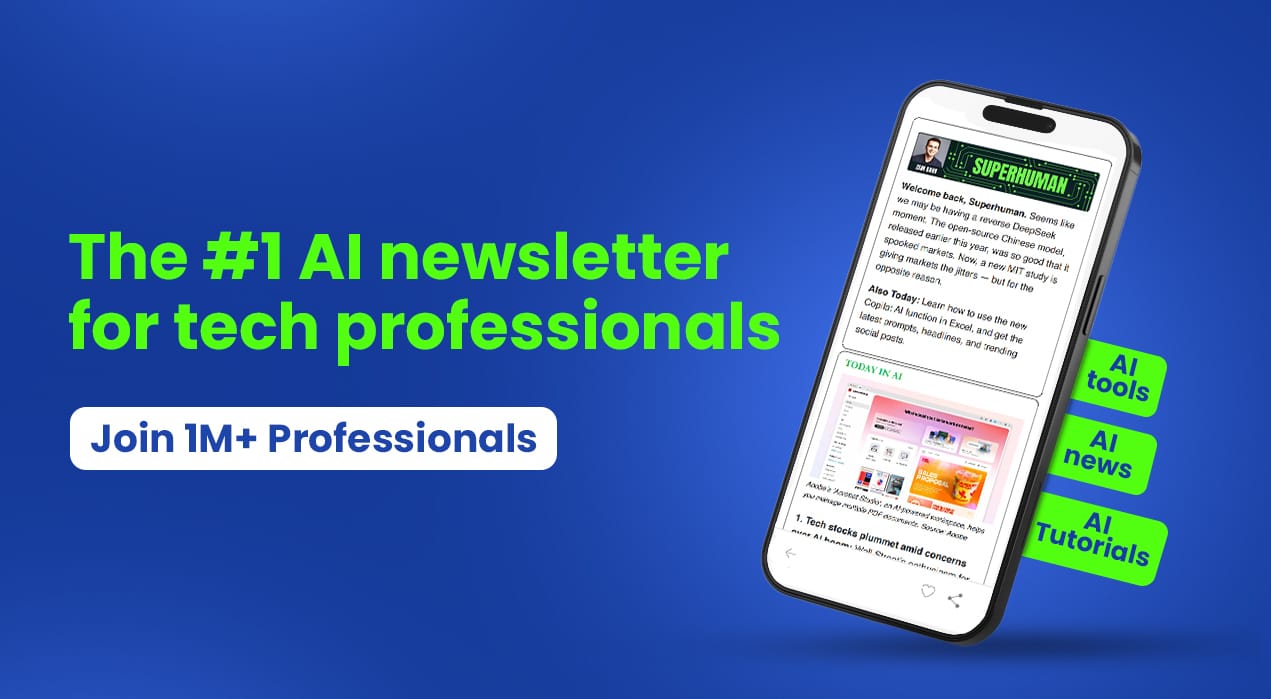- Jobless
- Posts
- Wtf Happened to the Tech Job Market?
Wtf Happened to the Tech Job Market?
It’s not just you. Here's a no-BS breakdown of why the job hunt is a nightmare right now.
Hey folks,
If you’ve ever stared at your screen after sending your 200th application into the void, wondering if you’re the problem… you’re not. The game is rigged.
Something is fundamentally broken in the entry-level tech market, and today we’re pulling back the curtain to show you exactly what it is. No platitudes, no "just try harder" bullshit. Just a clear diagnosis of the perfect storm we're all fighting through.
Here’s the plan:
Curated: A curated list of tools and resources you can use.
Main Read: The three forces that broke the junior job market.
Outro: How to fight back.
Let's get into it.
Become the go-to AI expert in 30 days
AI keeps coming up at work, but you still don't get it?
That's exactly why 1M+ professionals working at Google, Meta, and OpenAI read Superhuman AI daily.
Here's what you get:
Daily AI news that matters for your career - Filtered from 1000s of sources so you know what affects your industry.
Step-by-step tutorials you can use immediately - Real prompts and workflows that solve actual business problems.
New AI tools tested and reviewed - We try everything to deliver tools that drive real results.
All in just 3 minutes a day
Curated by Jobless
Layoffs.fyi: A real-time, comprehensive tracker of tech layoffs happening across the world.
Sourcely AI: Sourcely is your AI-powered academic search assistant, offering access to over 200 million papers and advanced search filters.
In Case You Missed It: According to reports from Testingcatalog, references to a “Gemini Beta 3.0 Pro” have been spotted inside the Gemini CLI tool codebase. Google may be working on a successor to the current Gemini 2.5 Pro and gearing up for its release soon👀.
WTF Happened to the Entry-Level Tech Job Market?
“Just get a CS degree,” they said. “It’s a guaranteed six-figure job,” they said.
That advice is officially dead. If you're a student or new grad, you're navigating the toughest entry-level tech market in over a decade. It's not a skill issue; it's a structural one. You’re caught in a perfect storm created by three massive forces.
1. The Great Contraction: Money Isn't Free Anymore
For about ten years, borrowing money was basically free for tech companies. This era, fueled by Zero-Interest-Rate Policy (ZIRP), meant VCs threw cash at startups, telling them to "grow at all costs." Hiring armies of junior developers to train on the job was part of that growth.
That party is over. With interest rates up, that "free money" is gone. The result? A brutal market correction. According to Layoffs.fyi, tech companies laid off over 425,000 employees in 2023 and 2024 combined.
The market is now flooded with experienced engineers from places like Google, Meta, and Amazon. Startups, starved for cash, have slashed hiring plans and can now hire a laid-off senior engineer for the price of two juniors.
You’re no longer just competing with your classmates; you’re competing with their ex-FAANG manager.
2. The AI Double-Punch: Your New Gatekeeper and Your New Competition
AI is hitting the entry level job market from two different angles, and both are brutal.
The AI Screener is your first boss battle. Before a human ever sees your name, your resume is fed to an Applicant Tracking System (ATS).
Jobscan reports that over 98% of Fortune 500 companies use one. These aren’t simple keyword filters anymore; they are sophisticated AI models that parse, score, and rank you against the job description.
If your resume isn't perfectly optimized for that specific role, you’re not just put at the bottom of the pile, you’re thrown out. The bot rejects you before a human even knows you exist.
Second, AI is raising the bar for "entry-level" work. Tools like GitHub Copilot don't replace junior devs, but they massively supercharge senior devs. Repetitive, entry-level tasks like writing boilerplate code, simple scripts, unit tests can now be done in seconds.
A single senior dev is now more productive, reducing the need for a larger supporting team of juniors. The definition of an "entry-level" contribution is now much, much higher.
3. The Vibe Shift: Why "Potential" is a Dirty Word in 2025
Combine the money crunch and the AI productivity boom, and you get a massive vibe shift in what companies want. Hiring a junior has always been an investment in their potential. A company would spend 6 months training them, knowing they wouldn't be truly productive on day one.
In 2025, potential is a liability.
Companies can't afford the time or money to train someone. They need contributors from week one. They don't want to see your GPA; they want to see your GitHub commit history. They don't care about your capstone project; they want to know if you've ever shipped code that real people have used.
So, Are We Screwed?
It's grim, no doubt. The perfect storm is real: a market flooded with experienced talent, less funding for new roles, and AI raising the bar while simultaneously gatekeeping opportunities.
But it’s not hopeless. It just means the old playbook is useless. Knowing these are the new rules is the first step. The next step is figuring out how to play the new game. And that’s exactly what we’ll be covering in the coming weeks.
What’s Next?
The good news is that we're here to help you navigate it. We'll be digging into tactics for beating the ATS, building a "recruiter-proof" portfolio, and finding the companies that are still betting on new talent.
Forward this to a friend who is also getting ghosted by recruiters. Let them know they're not alone.
Join the conversation in our reddit community at r/joblessCSMajors.
🌐 Check out our website for more articles and the web version of this post.
Until next time,
Team Jobless

